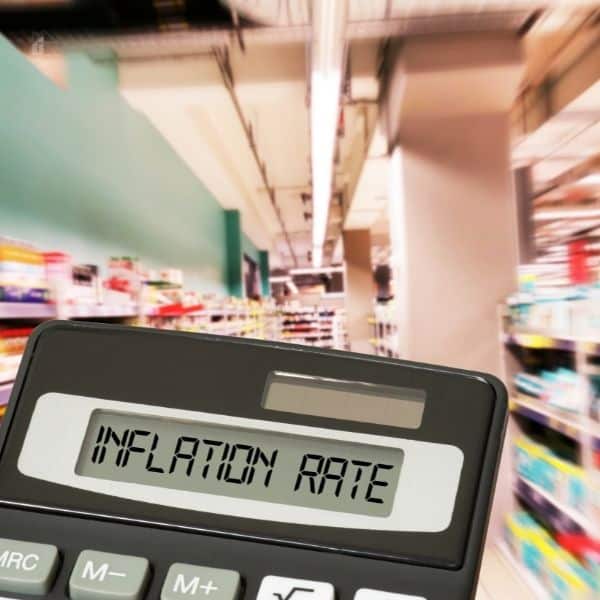How to Change Your Budget Categories Due to Inflation
This post may contain affiliate links which might earn us money. Please read my Disclosure and Privacy policies hereIt can be challenging to stick to your budget and maintain the same budget categories over time in today's economy. One factor contributing to budget category changes is inflation, which refers to the increase in prices of goods and services over time.
If you have not made any changes to your budget, I can guarantee you that you need to take the time and go over your budget and make some changes because everyone is being affected by the price changes.
And if you have been afraid to look at your budget for a long time and make some budget category changes, it is never too late. Here are some tips that can help you adjust your budget to reflect the current economic realities.

How do you adjust a budget for inflation?
One of the first steps to making budget category changes due to inflation is to review your budget and identify categories that may need to be adjusted. This could include increasing or decreasing spending in certain areas, such as housing, utilities, food, transportation, healthcare, education, etc.
Other considerations when updating your budget include considering any changes in income or expenses and analyzing your spending patterns and trends to understand where you can make adjustments.
Finally, it is essential to stay informed about economic developments and factors that may affect your budget category changes, such as the timing of tax refunds, changes in interest rates on savings accounts and loans, etc.
How does inflation affect budgeting?
Inflation is how prices for goods and services rise over time. It can impact budgeting, as budget categories may need to be increased or decreased due to changes in the cost of living.
Here are some tips for how to adjust your budget categories in light of inflation:
– Review your budget regularly. This will help you identify areas where your budget may need to be adjusted.
– Keep an eye on the cost of living. Changes in the cost of living can impact your budget categories.
– Make adjustments to your budget as needed. If you find that your budget needs to be adjusted, make the necessary changes to ensure that you can afford the things you need.
If you are concerned about inflation and its impact on budgeting, it may be a good idea to consult with an expert or financial advisor for advice on how best to manage your budget in light of changes in the cost of living. With careful planning, you can ensure that your budget stays on track no matter what changes may come.
How do you modify a budget?
To modify your budget, you will start by looking at your budget categories and identifying which ones might need to be changed to account for inflation.
First, take note of any budget items that have increased significantly in price over the past few months.
For example, if you have noticed that your grocery budget is getting higher every week or month, this may be a sign that you should consider adjusting your budget to account for inflation.
Another critical factor to consider is the overall budget category which has seen the most significant increase in spending.
If you notice that your gas budget has been steadily increasing, this may be a sign that it's time to make adjustments and reallocate those funds towards other areas where you need more support.

Is there an end to this inflation?
The Federal Reserve never anticipated inflation this severe or persistent. When they released their forecasts in December 2020, the Fed's policymakers had expected that consumer inflation would stay below their 2% annual target and end 2021 at around 1.8%.
Some analysts believe that the current inflationary pressures are due to factors. They point to rising wages, increased global demand for essential commodities like oil and natural gas, war, and ultra-low interest rates are drivers of inflation.
Although inflation had been relatively low and contained for many years, it suddenly rose rapidly last year.
In February 2021, inflation was running just 1.7% above its level from the previous year, but this figure quickly began to climb. By March, inflation had risen by 2.6%, followed by even more dramatic increases in subsequent months.
By October, inflation had reached 6.2%, hitting 6.8% by November. By December, inflation continued to spike, reaching 7%.
This sharp rise in inflation was caused by various factors, including increases in global commodity prices and rising interest rates that improved investment returns while reducing borrowing costs.
Inflation is no longer an afterthought – instead, it is a primary concern for policymakers around the world.
You might enjoy these posts:
How many times should I modify my budget due to inflation?
As I wrote above, this rising cost will not be going down any time soon, and this is just my opinion. So I recommend you review it monthly to make the necessary adjustments.
It is essential to review it regularly and make adjustments. Depending on the severity of inflation, you may need to modify your budget more frequently.
Making budget modifications can be difficult, but it is necessary to ensure that your budget stays afloat during periods of inflation. By being mindful of budget categories that inflationary pressures may impact, you can make the changes required to keep your budget on track.






